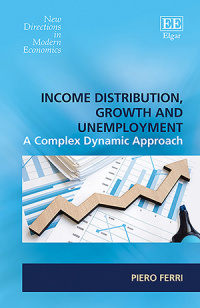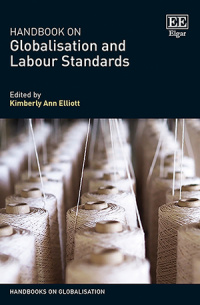Paperback
全球化后的工作
建立职业公民身份
9781848447783 Edward Elgar Publishing
在这个开创性的书,人站提供a new perspective on work and citizenship, rejecting the labourist orientation of the 20th century.
更多信息
Critical Acclaim
Contents
更多信息
在这个开创性的书,人站提供a new perspective on work and citizenship, rejecting the labourist orientation of the 20th century.
卡尔·波兰尼(Karl Polanyi)的《巨大变革》标志着工业公民身份的兴起,这取决于虚拟的劳动力破坏性。自1970年代以来,这已经崩溃,正在进行全球转变,在这种情况下,不平等和不安全感变得不可持续。盖伊·斯蒂恩(Guy Stapen)解释说,尽管与家长式的斗争至关重要,但对全球化引起的问题的理想平等反应是建立职业公民身份的战略。这是基于普遍经济安全和机构的权利,使每个人都能发展自己的能力和工作,同时尊重21世纪的生态要求。该书还探讨了劳动法的逐步淘汰,并重新定位了集体谈判对协作谈判的讨价还价,强调了工人与公民以及工人与资本之间关系的重要性。
全球化后的工作offers a new perspective on work, rejecting the labourist orientation of the 20th century. Social scientists interested in globalization and labour market issues will warmly welcome this book. It will also strongly appeal to students, researchers, policy-makers, social activists and those connected with the international regulation of occupations.
卡尔·波兰尼(Karl Polanyi)的《巨大变革》标志着工业公民身份的兴起,这取决于虚拟的劳动力破坏性。自1970年代以来,这已经崩溃,正在进行全球转变,在这种情况下,不平等和不安全感变得不可持续。盖伊·斯蒂恩(Guy Stapen)解释说,尽管与家长式的斗争至关重要,但对全球化引起的问题的理想平等反应是建立职业公民身份的战略。这是基于普遍经济安全和机构的权利,使每个人都能发展自己的能力和工作,同时尊重21世纪的生态要求。该书还探讨了劳动法的逐步淘汰,并重新定位了集体谈判对协作谈判的讨价还价,强调了工人与公民以及工人与资本之间关系的重要性。
全球化后的工作offers a new perspective on work, rejecting the labourist orientation of the 20th century. Social scientists interested in globalization and labour market issues will warmly welcome this book. It will also strongly appeal to students, researchers, policy-makers, social activists and those connected with the international regulation of occupations.
Critical Acclaim
‘。。。this book is a tour de force, providing a provocative analysis as well as a vision, rooted in normative reflection for a better world to work in. It should be mandatory reading for all students of social policy and industrial relations.’
- Martin Seeleib-Kaiser,《社会政策杂志》
‘This is a scholarly and erudite work. . . There is a wealth of detail, all illustrated with plenty of fascinating examples. . . It is impossible to give the full flavour of this thoughtful and stimulating book in even a long review, but it deserves to be widely accessible and read.’
- 公民收入
‘。。。这是有史以来最伟大的关于工作的书(以所有形式)。。。全球化后的工作为我们提供了启动新的社会民主计划所需的基础。。。帮自己一个忙,不要相信我。 You need to read this book for yourself. . . If you’re ever going to read a book about work, make it this one.’
- 彼得·霍尔·琼斯(Peter Hall-Jones),新的工会主义网络
‘This is an important book. It shifts emphasis from the role of capital to the creativity of labour in the creation of value in the real economy. A central role is accorded to each and all of the skills and occupations which contribute to the construction of an economy and a civic culture governed by the public interest. Guy Standing has made an original contribution to the validation of human creativity in the economic process. The work owes an acknowledged debt to the vision of Karl Polanyi.’
– Kari Polanyi-Levitt, McGill University, Canada
‘Standing has written a comprehensive account of what the forces and developments that govern the contemporary world (such as states, employers, trade unions, the globalization of labor markets, financial market crises etc.) do to workers and the conditions under which they work and live. It is rare for a social science work that is full of empirical information to be as accessibly written as this one. It is even rarer to find all three of the things that good social science can deliver – fine-grained description, original explanation, sophisticated normative reflection – in the pages of a single volume. One of the richest accounts of the fates of labor since Polanyi (1944).’
– Claus Offe, Hertie School of Governance, Germany
‘In Work after Globalization, Guy Standing, one of the most knowledgeable and theoretically sophisticated scholars in the area of labor relations today, paints a rich panorama of contemporary labor practices around the world to demonstrate that we are in the midst of a societal shift of historical dimensions. Standing’s concept of occupational citizenship provides a way to re-capture both human agency and community, thereby reconciling the individual with society and flexibility with new forms of social security. This book is a tour de force for its sweeping scope, incisive analysis, and predictive power.’
- 凯瑟琳·斯通(Katherine Stone),加利福尼亚大学,洛杉矶,美国
- Martin Seeleib-Kaiser,《社会政策杂志》
‘This is a scholarly and erudite work. . . There is a wealth of detail, all illustrated with plenty of fascinating examples. . . It is impossible to give the full flavour of this thoughtful and stimulating book in even a long review, but it deserves to be widely accessible and read.’
- 公民收入
‘。。。这是有史以来最伟大的关于工作的书(以所有形式)。。。全球化后的工作为我们提供了启动新的社会民主计划所需的基础。。。帮自己一个忙,不要相信我。 You need to read this book for yourself. . . If you’re ever going to read a book about work, make it this one.’
- 彼得·霍尔·琼斯(Peter Hall-Jones),新的工会主义网络
‘This is an important book. It shifts emphasis from the role of capital to the creativity of labour in the creation of value in the real economy. A central role is accorded to each and all of the skills and occupations which contribute to the construction of an economy and a civic culture governed by the public interest. Guy Standing has made an original contribution to the validation of human creativity in the economic process. The work owes an acknowledged debt to the vision of Karl Polanyi.’
– Kari Polanyi-Levitt, McGill University, Canada
‘Standing has written a comprehensive account of what the forces and developments that govern the contemporary world (such as states, employers, trade unions, the globalization of labor markets, financial market crises etc.) do to workers and the conditions under which they work and live. It is rare for a social science work that is full of empirical information to be as accessibly written as this one. It is even rarer to find all three of the things that good social science can deliver – fine-grained description, original explanation, sophisticated normative reflection – in the pages of a single volume. One of the richest accounts of the fates of labor since Polanyi (1944).’
– Claus Offe, Hertie School of Governance, Germany
‘In Work after Globalization, Guy Standing, one of the most knowledgeable and theoretically sophisticated scholars in the area of labor relations today, paints a rich panorama of contemporary labor practices around the world to demonstrate that we are in the midst of a societal shift of historical dimensions. Standing’s concept of occupational citizenship provides a way to re-capture both human agency and community, thereby reconciling the individual with society and flexibility with new forms of social security. This book is a tour de force for its sweeping scope, incisive analysis, and predictive power.’
- 凯瑟琳·斯通(Katherine Stone),加利福尼亚大学,洛杉矶,美国
Contents
Contents: Preface 1. Work and Labour in Great Transformations 2. Fictitious Decommodification: The Failure of Industrial Citizenship 3. Labour Recommodification in the Global Transformation 4. Inequality, Class and the ‘Precariat’ 5. Crumbling Barriers to Decommodification 6. Occupational Dismantling and Commodification 7. Occupational Regulation 8. The Horror 9. Reviving Occupation in Full Freedom 10. Economic Rights: The Progressive Agenda Bibliography Index




